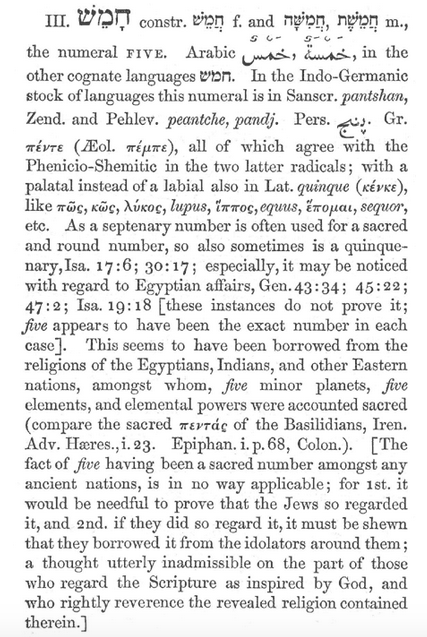It is of note that the story of the famine, as recorded in Genesis, uses the word "five" five times.
| Reference |
Text (KJV) |
| Gen. 43:34 |
And he took and sent messes unto them from before him: but Benjamin's mess was five times so much as any of theirs. And they drank, and were merry with him. |
| Gen. 45:6 |
For these two years hath the famine been in the land: and yet there are five years, in the which there shall neither be earing nor harvest. |
| Gen. 45:11 |
And there will I nourish thee; for yet there are five years of famine; lest thou, and thy household, and all that thou hast, come to poverty. |
| Gen. 45:22 |
To all of them he gave each man changes of raiment; but to Benjamin he gave three hundred pieces of silver, and five changes of raiment. |
| Gen. 47:2 |
And he took some of his brethren, even five men, and presented them unto Pharaoh. |
Gesenius' lexical entry for "five" contains the following.

According to Gesenius, the Egyptians held the number five to be sacred, and many of their sacred things came in sets of five. This may be why Joseph (and Moses, who wrote the book of Genesis and was educated in Pharaoh's court) would have been so ready to consider things in terms of this number. However, Gesenius is careful to distance the Egyptians' belief from that of the Jews.
But there is more...
The word "five" in Hebrew is formed from the root letters heth, mem, and shin. In Hebrew, root letters of a word can be highly significant, and show connections to the meanings of other words using the same root. In the table below, those connections can be seen.
| Word |
Root |
Part of speech |
Meaning |
| לְהִתְחַמֵּשׁ lehitchamesh |
ח-מ-שׁ |
Verb – hitpa'el |
to be armed, equipped |
| חוֹמֶשׁ chomesh |
ח-מ-שׁ |
Noun – kotel pattern, masculine |
fifth part |
| חֲמִישִׁי chamishi |
ח-מ-שׁ |
Adjective – ktili pattern |
fifth |
| חָמוּשׁ chamush |
ח-מ-שׁ |
Adjective – katul pattern |
armed |
| חָמֵש chamesh |
ח-מ-שׁ |
Cardinal numeral |
five |
| תַּחְמוֹשֶׁת tachmoshet |
ח-מ-שׁ |
Noun – tiktolet pattern, feminine |
ammunition, munitions |
| חִימּוּשׁ chimush |
ח-מ-שׁ |
Noun – kittul pattern, masculine |
munition, arming (military); ammunition, ordnance |
| לְחַמֵּשׁ lechamesh |
ח-מ-שׁ |
Verb – pi'el |
to arm |
As the table shows, the Hebrew words associated with the same root letters found in the word for "five" have to do with military armament. This directly connects to the story of the five smooth stones of David. This connection is built into the language of Hebrew itself.
